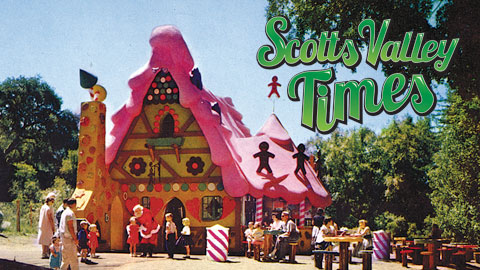By W. Wilde
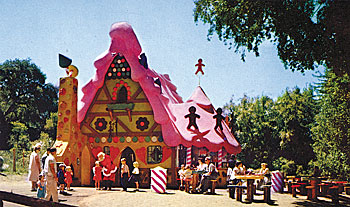 The reaction is always the same … “Aaww, I went there when I was a kid.” Almost everyone in Santa Cruz, over a certain age, remembers Santa’s Village in Scotts Valley. Open year-round, it has come to represent a simpler time when even adults believed in the joy of Santa Claus.
The reaction is always the same … “Aaww, I went there when I was a kid.” Almost everyone in Santa Cruz, over a certain age, remembers Santa’s Village in Scotts Valley. Open year-round, it has come to represent a simpler time when even adults believed in the joy of Santa Claus.
Back then, there were no video games and kids went outside and played, using their imagination to become soldiers, cowboys or princesses. Highway 17 was just a simple two-lane road through the mountains. There were no on- or off-ramps, but you could get homemade apple cider up near the Summit.
Noel Smith, editor at Times Publishing, remembers stopping there while visiting Santa Cruz. Having been to other theme parks around the country, Noel was impressed by how first-class our Santa’s Village was: “There was great attention to detail to make it as realistic as possible.”
As a kid, I thought it was pure magic that Santa’s Village had a North Pole that was always icy and freezing cold. I wanted to lick it to see if my tongue would really stick, but my mom was always watching.
So many memories… Claudia Brown went there as a reward for having her tonsils out. Christine Giulianelli writes, “I have such fond memories of Santa’s Village. I have pictures of Santa on the trolley waving to me on the snowball ride (like Disneyland’s teacups). It was a magical place for kids.”
First Theme Park Franchise
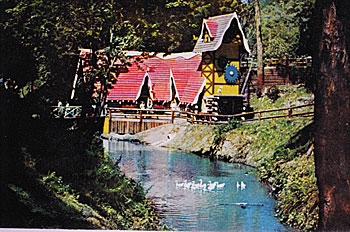 Santa’s Village was the first franchised theme park in the country. Number one opened Memorial Day weekend of 1955 near Lake Arrowhead in San Bernardino County. It beat Disneyland’s opening by less than six weeks. While Walt Disney struggled to find investors for a theme park based on a cartoon mouse and Sleeping Beauty’s Castle, Santa’s Village was the vision of: Glen Holland, a Southern California developer.
Santa’s Village was the first franchised theme park in the country. Number one opened Memorial Day weekend of 1955 near Lake Arrowhead in San Bernardino County. It beat Disneyland’s opening by less than six weeks. While Walt Disney struggled to find investors for a theme park based on a cartoon mouse and Sleeping Beauty’s Castle, Santa’s Village was the vision of: Glen Holland, a Southern California developer.
Scotts Valley was the second of the three theme villages, with a third Santa’s Village opening near Chicago in Dundee, Illinois. General contractor Putnam Henck built Santa’s Village in Scotts Valley in 9 months at the cost of one million dollars – which would be over $8 million today! Our very own local Santa’s Village officially opened to large crowds on Memorial Day Weekend: May 30, 1957.
North Pole Characters
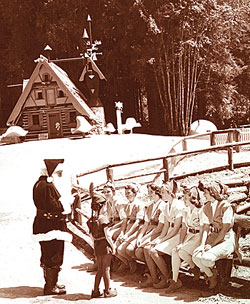 Scotts Valley’s first Santa Claus was played by Carl Hansen, a native of Denmark with Alma Ragon as Mrs. Claus. After five years as Santa, Hansen left to have his own popular TV show on KNTV as Hocus Pocus the Clown and magician.
Scotts Valley’s first Santa Claus was played by Carl Hansen, a native of Denmark with Alma Ragon as Mrs. Claus. After five years as Santa, Hansen left to have his own popular TV show on KNTV as Hocus Pocus the Clown and magician.
Elves, pixies and gnomes dressed in green or beige leather vests, green leotards, pointed elf boots with bells, and a green felt hat with a green ostrich feather. They sold tickets, souvenirs, food and refreshments. Ride operators wore leather Lederhosen, suspenders and knee-high socks. For many who worked there, it was a dream job.
Characters from Alice in Wonderland, Jack Pumpkin Head, the Easter Bunny, Little Bo Peep, and a Good Witch wandered throughout the grounds, greeting youngsters. Sometimes there would be local celebrity guests such as Captain Satellite, Smokey the Bear, and Romper Room’s Miss Nancy.
The Many Attractions
From puppet shows to a petting zoo, there was plenty of free entertainment. Kids could feed goats, sheep, bunnies, ducks, deer and a Mexican burro. Popular entertainer, Penny Peck, was the piano playing chicken. Reindeer imported from Unalakleet, Alaska pulled Santa around in his sleigh.
Children could also get lost in the Alice in Wonderland Maze, gaze upon a giant Jack-in-the-Box, Santa’s Enormous Boot, Queen of Hearts figure, or visit a puppet theatre or the “refrigerated” North Pole.
Only the rides cost money, including a bobsled roller coaster, spinning snowballs (now re-themed and still in operation at The Boardwalk), a giant whirling Christmas tree ride, pony carts and a miniature train.
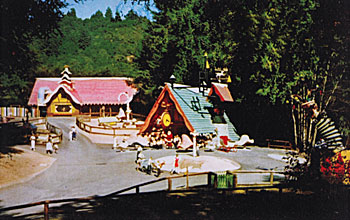 The brightly colored mushrooms can still be spotted here and there around the county. According to Norwegian legend, Vindicans (ancestors to pixies, elves and gnomes) lived in the giant toadstools and mushrooms.
The brightly colored mushrooms can still be spotted here and there around the county. According to Norwegian legend, Vindicans (ancestors to pixies, elves and gnomes) lived in the giant toadstools and mushrooms.
Visitors could wander around the Village and visit Santa’s workshop, Santa’s oversize mailbox (to leave your letters for Santa), see treetop-tall wooden soldiers and candy canes, visit a gingerbread house, the mill-wheel toy factory along the creek, a lollipop tree, a magic shop, the reindeer barn and a gift shop. Mrs. Claus had a kitchen that served hamburgers, hotdogs and steak sandwiches. Santa even had a Standard Oil (now known as Chevron) gas station to fuel the visitor’s cars!
Appropriate holiday music flowed from speakers hidden in the trees. Upkeep was very important and structures were continuously painted and paths were kept clean. Santa’s Village, in its lovely redwood setting, was a fairyland for young and old.
Time Changes the Village
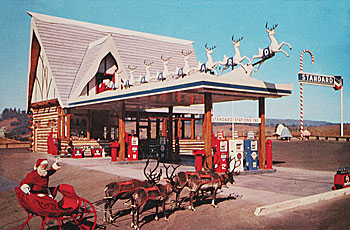 In 1966, Noorudin Billawalla purchased the Santa’s Village property, leasing it back to Santa’s Village Corporation until they went bankrupt in 1977. Billawalla changed the name to “The Village” and promoted it as an arts and crafts fair, but two years later, Santa’s Village closed forever. Since 1985, the property has changed hands a half dozen times. In 1992, Borland tore down or sold the village’s buildings. Some are being used as bed and breakfast cabins at Sorenson’s Resort near Lake Tahoe. The current property owner, Lennox Homes, has proposed a 40 resident development there.
In 1966, Noorudin Billawalla purchased the Santa’s Village property, leasing it back to Santa’s Village Corporation until they went bankrupt in 1977. Billawalla changed the name to “The Village” and promoted it as an arts and crafts fair, but two years later, Santa’s Village closed forever. Since 1985, the property has changed hands a half dozen times. In 1992, Borland tore down or sold the village’s buildings. Some are being used as bed and breakfast cabins at Sorenson’s Resort near Lake Tahoe. The current property owner, Lennox Homes, has proposed a 40 resident development there.
The off-ramp signs still announce the ghost of Santa’s Village. Many who pass there reminisce, some even shed a tear, some wish they could take their children and grandchildren back to the uncomplicated times of Santa’s Village. The rides, though simple, were fun for all ages. Entry was free, so a family could go and have a good time for very little money. Ed Blake commented that it was “a fun place to go to that wouldn’t impact your budget. Not like what you have to put out to go to Great America or Disneyland.”
Santa’s Village in Scotts Valley will be featured on a new show called “Lost Parks of Northern California” (greatamericanthrills.net/lost-parks) hosted by Kristopher Rowberry on Bay Area NBC. The day they arrived to shoot the Santa’s Village episode, the bulldozers were there to tear down the last of the buildings, the barn used to house the reindeer. They were excited to find a treasure old ticket stubs and other memorabilia still there.
We seemed to have lost our innocence somewhere around 1977 needing faster rides and bigger thrills. When computers, iPods, iPads and iPhones became popular, kids stopped having to use their imaginations. Their destinations became small screens with action heroes rather than an old-fashioned Santa’s Village, but are we all better for it?
•••
Special thanks to Frank Perry at Capitola Historical Museum and Eric Taylor for the use of the photos.

